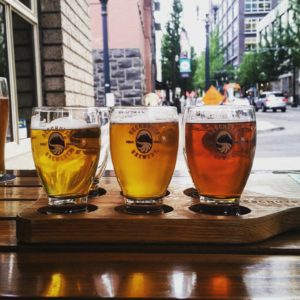Craft Beer and Sustainability
By Emily Powell
I wouldn’t be able to name on my two hands the craft breweries that have popped up within the last five years in Arizona (the state I call home). And although I can’t yet enjoy a cold, tall pint of whatever ale/stout/lager Phoenix breweries have to offer due to my age, I can appreciate how lively and vibrant a culture of local social hot spots have been bred by the creation of local tap rooms and breweries. With natural flavors ranging from key lime pie to watermelon oat to peanut butter to coffee, craft beer and all its personable creativity works hard to bring ingenuity and creativity to regional and local communities. Along with some entertaining places to relax at the end of a work week, these breweries are also bringing something unexpected to the table (or bar?): a fierce and determined mission for sustainability.

The need for waste and impact reduction in brewing (both industrial and small-scale) is obvious through statistics. For example, it takes seven to nine gallons of water to produce one gallon of beer. One barrel produces 50 pounds of solid waste, including spent grains, yeast, and hops. The statistics of environmental and economic implications of brewing beer are beyond calculation, especially if you start at the base of the food system with grain seed manufacturing and follow it through to the tap from which it’s poured on a hopping (pun) Friday night. Fossil fuels are needed to fuel the energy to heat and cool water and liquid repeatedly throughout the brewing process. These sustainability issues associated with brewing have not gone unnoticed, however, and the industry’s leaders are taking wide strides to expand the enforcement of sustainable practices.
As a demonstration of those efforts, the “Brewery Climate Declaration” was signed by dozens of the industry’s largest (and smallest) brewers. It’s a non-legally binding agreement to acknowledge that breweries have the capacity and the responsibility to improve their sustainability and reduce their negative impacts on communities through the following initiatives:
- Measuring greenhouse gas emissions released through their processes
- Using renewable energy
- Recycling steam to reduce energy consumption through the brewing process
- Capturing methane released during the wastewater treatment process
- Cutting transportation/distribution emissions
- Becoming LEED certified
Learn more about the agreement and what exactly these breweries have changed about their operations to reflect these commitments at the website linked at the bottom of this article.
So, it’s obvious that brewing is an industry where sustainable practices are necessary. And companies agree. But what are they doing about it?
Well, Tucson’s Borderlands Brewing, founded by two science geeks from the University of Arizona, showcases their efforts proudly. They conserve energy by brewing beers that are suitable for natural southwest water, while other breweries distill tap water from the region and then add necessary mineral back into it to make it appropriate for certain types of beers. They use non-toxic chemicals for cleaning practices and divert spent grain from the landfill through composting. Their brewery is also a proud member of the organization “Conserve 2 Advance,” which encourages businesses operating in the desert southwest to conserve water. In brewing “hand-crafted ales with a focus on local ingredients and community,” they also bring the standard for brewery sustainability to new heights. Kudos.
Tucson’s Nimbus Brewery managing partner Jim Counts is quoted displaying similar enthusiasm in August 2012’s Green Living Magazine, saying “we recycle the water through the heat exchanger to brew the next batch… reducing our water usage [from seven to nine gallon]) to two gallons. Living in Arizona, we need to be careful about our consumption.”
Sierra Nevada Brewing generates at least 50% of its energy from on-site solar panels, creating one of the country’s largest privately-owned photovoltaic systems.
Jack Lamb, CEO and owner of Aslan Brewing, is quoted in Mint Press News in April of 2015 explaining an example of their commitment to sustainability: “Even though we wanted to can in 16 oz. cans, we found out that 12 oz. cans were produced in Olympia, WA, while 16 oz. cans came somewhere east of the Mississippi… So, looks like we’re canning 12 oz. cans!”
Similar efforts can be found on the websites of many small-scale breweries that have recognized the increasing demand and need for sustainable practices. I think it’s awesome that a rising industry, while bringing a cohesiveness to communities through locally-produced beer, is also expanding the awareness and initiative for addressing climate concerns. In a market where one brewery job supports 45 employment positions in the supply chain and production process behind it, the possibility for expanding sustainability to new heights is almost too exciting to not start a conversation about. This weekend, see what you can learn about sustainability at your local brewery. You’ll probably be pleasantly surprised.
Cool links:
Brewery Climate Declaration
The Nation’s Most Sustainable Breweries
 Emily’s exuberant passion for sustainability and sustainable nutrition stems from her everlasting love for the outdoors, people, dirt, and broccoli. As an undergraduate in the School of Sustainability at Arizona State University, Emily is working towards becoming a spokesperson for everyday sustainable food and lifestyle choices, including decisions on what foods you buy, where you buy them, and how you make the most of foods’ energy. Leveraging communication through writing, Emily has been recognized in competitions such as the DuPont Challenge and the Apprentice Ecologist Initiative for her essays on sustainability issues and initiatives, including Honeybee Colony Collapse Disorder and community gardens in elementary schools. Emily aspires to utilize relationships with other academic disciplines to plant the seeds of sustainability and nutrition principles in the young adults of her generation. She plans to earn her Registered Dietitian credential and work either on the community or personalized sustainable nutrition level.
Emily’s exuberant passion for sustainability and sustainable nutrition stems from her everlasting love for the outdoors, people, dirt, and broccoli. As an undergraduate in the School of Sustainability at Arizona State University, Emily is working towards becoming a spokesperson for everyday sustainable food and lifestyle choices, including decisions on what foods you buy, where you buy them, and how you make the most of foods’ energy. Leveraging communication through writing, Emily has been recognized in competitions such as the DuPont Challenge and the Apprentice Ecologist Initiative for her essays on sustainability issues and initiatives, including Honeybee Colony Collapse Disorder and community gardens in elementary schools. Emily aspires to utilize relationships with other academic disciplines to plant the seeds of sustainability and nutrition principles in the young adults of her generation. She plans to earn her Registered Dietitian credential and work either on the community or personalized sustainable nutrition level.
*Disclosure:
Some of the links in our podcast show notes and blog posts are affiliate links and if you go through them to make a purchase, we will earn a nominal commission at no cost to you. We offer links to items recommended by our podcast guests and guest writers as a service to our audience and these items are not selected because of the commission we receive from your purchases. We know the decision is yours, and whether you decide to buy something is completely up to you.







